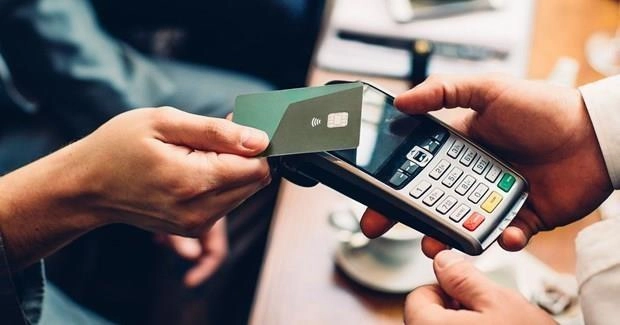- The Law on Value Added Tax 2024, No. 48/2024/QH15, was passed by the National Assembly on November 26, 2024, bringing many important changes in the management and deduction of value added tax (VAT). One of the notable points that has a great impact on most businesses is the new regulation on non-cash payment documents for purchased goods and services.
Accordingly, from July 1, 2025, input VAT deduction for purchases of goods and services worth less than VND 20 million will also require non-cash payment documents, except for some special cases as prescribed by the Government.
Let's find out about this new regulation with Bizzi Vietnam!

New regulations on non-cash payment documents in the 2024 VAT Law
Point b, Clause 2, Article 14 of the Law on Value Added Tax (VAT) 2024, No. 48/2024/QH15 stipulates one of the conditions for input VAT deduction as follows:
b) Have non-cash payment documents for purchased goods and services, except for some special cases as prescribed by the Government;
Thus, according to the 2024 VAT Law, the general principle is that all purchased goods and services must have non-cash payment documents to be eligible for input VAT deduction. This regulation marks an important change compared to current regulations.
Compare with current regulations
Currently, according to Clause 6, Article 1 of the Law amending and supplementing the Law on VAT 2013 (amending and supplementing Point b, Clause 2, Article 12 of the Law on VAT 2008), one of the three conditions for input value added tax deduction is:
b) Have non-cash payment documents for purchased goods and services, except for goods and services purchased at a time with a value of less than twenty million VND;
It is clear that current regulations allow businesses to deduct input VAT on goods and services purchased at a time with a value of less than 20 million VND without requiring non-cash payment documents. This creates favorable conditions for small transactions and cash payments.
However, the 2024 VAT Law has eliminated this exception. From July 1, 2025, having a non-cash payment document becomes a mandatory condition for all transactions of purchasing goods and services if the enterprise wants to deduct input VAT, except for some special cases that will be regulated by the Government.
Supplement on input VAT deduction documents for exported goods and services
In addition to changes in non-cash payment documents, Point c, Clause 2, Article 14 of the 2024 Law on VAT also adds a number of documents that are deductible for input VAT on exported goods and services:
c) For exported goods and services, in addition to the conditions specified in Points a and b of this Clause, there must also be: a contract signed with a foreign party on the sale, processing of goods, provision of services; invoices for the sale of goods and provision of services; non-cash payment documents; customs declaration for exported goods; packing list, bill of lading, goods insurance documents (if any). The Government shall stipulate the conditions for deduction in the case of exporting goods via e-commerce platforms abroad and some other special cases.
Accordingly, for exported goods and services, in addition to invoices and non-cash payment documents, enterprises must have additional contracts, customs declarations and related transportation and insurance documents (if any) to be able to deduct input VAT. This is also a new regulation compared to the current Law, increasing transparency and strictness in tax deduction for export activities.
Impact of new regulations on businesses
New regulations on non-cash payment documents for goods and services under VND20 million will have a significant impact on the operations of businesses, especially those with many transactions to purchase goods and services of small value.
- Request to change payment habitsBusinesses will need to change their habit of paying in cash for small transactions and switch to non-cash payment methods such as bank transfers, card payments, e-wallets, etc.
- Enhance management of invoices and documents: Having non-cash payment documents means that businesses need to more closely manage invoices and purchase documents to ensure eligibility for tax deductions.
- Impact on small businesses: Small businesses, especially those not used to using cashless payments, will need to prepare and adapt to the new regulations.
- Promote cashless payments: This regulation is expected to contribute to promoting the trend of cashless payments in the economy, increasing transparency and minimizing risks related to cash transactions.
Application Corporate credit card solution integrated with expense management platform
In the context of the new regulations of the 2024 VAT Law requiring non-cash payment documents for all transactions of purchasing goods and services to be deducted from input VAT (except for some special cases), Bizzi Vietnam's solution set, especially the Corporate Credit Card integrated with the cost management platform, becomes a powerful tool to help businesses strictly control spending and effectively meet the requirements of non-cash payment.
Bizzi – Shinhan corporate credit card is a superior solution combining business credit card issued by Shinhan Bank integrating the smart expense management platform Bizzi Expense.

This solution offers many outstanding benefits, helping businesses manage expenses in a comprehensive and streamlined manner, while completely complying with the requirements for non-cash payment documents according to the 2024 VAT Law.
Bizzi features that support compliance with new regulations:
- Cashless payment for all transactions: With Bizzi corporate credit card, businesses can easily make payments for all purchases of goods and services, even small value, ensuring that they meet the mandatory conditions for non-cash payment documents.
- Automate the process of collecting invoices as payment requests: The Bizzi Expense platform automatically collects invoices associated with card transactions, reducing manual reconciliation efforts and ensuring complete documentation for tax deductions.
- Easy and tight cost control and management: Bizzi provides detailed tracking of all business card spending transactions, making reconciliation and expense management easier and more accurate. All card transactions are recorded electronically, creating a valid non-cash payment document.
- Display quick spending information report: The Bizzi Expense system provides detailed and visual reports on the business's spending situation, supporting management to update expenditures and effectively control budgets. These reports can be used to track and reconcile invoices, ensuring the accuracy of payment documents.
- Control spending by limit: Businesses can set spending limits for each card, department or employee, helping to tightly control budgets and avoid the risk of overspending. This also ensures that all expenses are officially approved and recorded, supporting the management of payment documents.
- Spend now, pay later, up to 45 days: Bizzi credit cards offer up to 45 days interest-free, giving businesses more control over their cash flow and more time to collect and process payments.
- Separate personal and business expenses: Using a Bizzi corporate credit card helps to clearly separate personal and business expenses, simplifying accounting and tax management. All transactions are recorded under the corporate legal entity, making it easy to reconcile and provide valid payment documents.
- Track business spending with complete, centralized spend visibility: The Bizzi Expense platform provides detailed and centralized visibility into all business spending transactions, making it easy for accountants and managers to track and reconcile payment documents.
- Support to control cash flow and financial situation of the organization: By centralizing credit card and expense management, businesses can improve working capital and manage cash flow effectively, thereby maximizing profits. Cashless card payments also help track cash flows in a transparent and documented manner.
- By limiting budgets for each department and employee, the warning system helps ensure that businesses avoid the risk of overspending: Bizzi not only helps with cashless payments but also provides tools to manage and control expenses closely, ensuring all expenses are reasonable and have full payment documents.
Benefits when businesses apply Bizzi in the context of new laws:
- Easy compliance with new regulations: Bizzi helps businesses conveniently switch to cashless payments, meeting mandatory payment document requirements under the 2024 VAT Law.
- Minimize the risk of input VAT exclusion: Using the card and Bizzi expense management platform ensures that every transaction has a valid electronic payment document, minimizing the risk of input VAT being excluded by the tax authorities.
- Save time and resources: Bizzi's automated processes reduce the manual work of collecting, reconciling and managing invoices, freeing up resources for other important tasks.
- Improve cost management efficiency: Bizzi provides powerful tools to effectively track, analyze and control costs, helping businesses make better financial decisions.
- Enjoy great deals: Bizzi – Shinhan corporate credit card also offers many incentives from Shinhan and Bizzi, helping businesses save costs and improve business efficiency. For example, Bizzi welcome offers include a free cost management account and month of use, discounts for other solutions on the Bizzi platform, Shinhan reward points accumulation, and conditional annual fee waiver.
The new regulation in the 2024 VAT Law on mandatory non-cash payment documents for all transactions of purchasing goods and services (except for some special cases) will officially take effect from July 1, 2025. To ensure compliance with regulations and optimize input VAT deduction, businesses need to proactively change payment habits and strengthen management of invoices and documents.
In that context, the Bizzi Corporate Credit Card solution integrated with the expense management platform has emerged as an effective tool, helping businesses easily meet the requirements of cashless payments, automate expense management processes and improve financial performance. The application of Bizzi not only helps businesses comply with the law but also brings many practical benefits in controlling expenses, managing cash flow and maximizing profits.
Businesses should research and consider implementing cashless payment solutions and effective cost management like Bizzi right now to best prepare for upcoming changes to the VAT Law.
FREE WEBINAR: “CASHLESS PAYMENT – IF IT'S SO DIFFICULT, WHY RESPOND?”
Is your business ready for the changes in non-cash payments under the VAT Law 2024, which will take effect from July 1, 2025? The new regulation requires invoices under VND 20 million to have non-cash payment documents to be deductible for VAT, which can cause many challenges in managing and adjusting the current payment process. Understanding these difficulties, Bizzi Vietnam cooperated with GHC to organize a webinar “Cashless Payment – So Difficult, How to Deal With It?” aims to provide practical knowledge and solutions so that businesses can confidently respond to these important changes.

By participating in the event, you will:– Comprehensive update of IMPORTANT changes of the 2024 VAT Law related to VAT deduction conditions for invoices under 20 million VND- Understand the legal regulations and practical impacts on business operations of enterprises- Discover OVERVIEW SOLUTIONS and ADVANCED DIGITAL TECHNOLOGY to help optimize payment processes and comply with tax authority requirements- Listen to VALUABLE sharing from LEADING EXPERTS in the field of Tax and Finance:
- Mr. Tran Nguyen - Former Head of Tax Department (HSBC) & Former Tax Manager of PwC.
– Former Tax Consultant of PetroVietnam Drilling and Well Services Corporation (PV Drilling).- Tax Expert (Corporate Income Tax (CIT), Personal Income Tax (PIT), Value Added Tax (VAT), Foreign Contractor Tax, Double Taxation Avoidance Agreement/Tax Agreement).
- Mr. Tran Le Hung – CEO of GHC
– Head of Data and Finance of Hiip.asia & Head of Finance and Operations of OI BJC.- Former CFO – Orochi Network and held senior positions at OI BJC, Medtronic, Uniben,..- Master of Public Policy (MPP) of Fulbright Vietnam (Class of 2023-2025) & Experienced in valuing startups and building business models.
- Mr. Huy Nguyen - Digital transformation consultant of Bizzi Vietnam
– Nearly 10 years of experience in consulting and implementing successful automation solutions for businesses such as Masan, Wincommerce, Emart, etc.- A speaker with a lot of experience sharing at events for the Vietnamese business community in the fields of retail, FMCG, etc. Webinar Information:– Time: 14:00 – 15:30, Thursday, April 10, 2025- Format: ONLINE via Zoom- Participation fee: COMPLETELY FREE Don't miss the opportunity to equip yourself with knowledge and optimal solutions for your business!>> Register now at: https://forms.gle/bkJC4Lh3s28h18Cm8 Monitor Bizzi To quickly receive the latest information:
- Facebook: https://www.facebook.com/bizzivietnam
- Linkedin: https://www.linkedin.com/company/bizzi-vietnam
- Youtube: https://www.youtube.com/@bizzivietnam


